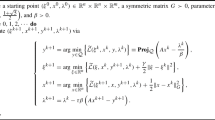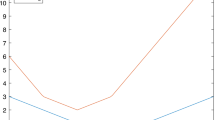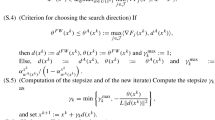Abstract
NE/SQP (Refs. 2–3) is a recent algorithm that has proven quite effective for solving the nonlinear complementarity problem (NCP). NE/SQP is robust in the sense that its direction-finding subproblems are always solvable; in addition, the convergence rate of this method is q-quadratic. In this note, we consider a generalized version of NE/SQP, as first described in Ref. 4, which is suitable for the bounded NCP. We extend the work in Ref. 4 by demonstrating a stronger convergence result and present numerical results on test problems.
Similar content being viewed by others
References
Gabriel, S. A., Algorithms for the Nonlinear Complementarity Problem: The NE/SQP Method and Extensions, PhD Thesis, Johns Hopkins University, 1992.
Pang, J. S., and Gabriel, S. A., NE/SQP: A Robust Algorithm for the Nonlinear Complementarity Problem, Mathematical Programming, Vol. 60, pp. 295–337, 1993.
Gabriel, S. A., and Pang, J. S., An Inexact NE/SQP Method for Solving the Nonlinear Complementarity Problem, Computational Optimization and Applications, Vol. 1, pp. 67–91, 1992.
Pang, J. S., and Qi, L., Nonsmooth Equations: Motivation and Algorithms, SIAM Journal on Optimization, Vol. 3, pp. 443–465, 1993.
Gill, P. E., Murray, W., and Saunders, M. A., User's Guide for QPOPT 1.0: A FORTRAN Package for Quadratic Programming, Department of Mathematics, University of California, San Diego, California, 1995.
Murphy, F. H., Sherali, H. D., and Soyster, A. L., A Mathematical Programming Approach for Determining Oligopolistic Market Equilibrium, Mathematical Programming, Vol. 24, pp. 92–106, 1982.
Hock, W., and Schittkowski, K., Test Examples for Nonlinear Programming Codes, Springer Verlag, Berlin, Germany, 1981.
Friesz, T. L., Tobin, R. L., Smith, T. E., and Harker, P. T., A Nonlinear Complementarity Formulation and Solution Procedure for the General Derived Demand Network Equilibrium Problem, Journal of Regional Science, Vol. 23, pp. 337–359, 1983.
Aashtiani, H. Z., The Multi-Modal Traffic Assignment Problem, PhD Thesis, Sloan School of Management, Massachusetts Institute of Technology, 1979.
Aashtiani, H. Z., and Magnanti, T. L., Equilibria on a Congested Transportation Network, SIAM Journal on Algebraic and Discrete Methods, Vol. 2, pp. 213–226, 1981.
De Luca, T., Facchinei, F., and Kanzow, C., A Semismooth Equation Approach to the Solution of Nonlinear Complementarity Problems, Mathematical Programming, Vol. 75, pp. 407–439, 1996.
Billups, S. C., and Ferris, M., QPCOMP: A Quadratic Programming Based Solver for Mixed Complementarity Problems, Vol. 76, pp. 533–562, 1997.
Author information
Authors and Affiliations
Rights and permissions
About this article
Cite this article
Gabriel, S.A. An NE/SQP Method for the Bounded Nonlinear Complementarity Problem. Journal of Optimization Theory and Applications 97, 493–506 (1998). https://doi.org/10.1023/A:1022643104274
Issue Date:
DOI: https://doi.org/10.1023/A:1022643104274




